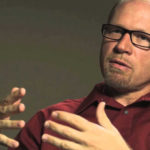We run our website the way we wished the whole internet worked: we provide high quality original content with no ads. We are funded solely by your direct support. Please consider supporting this project.

The God Who Over-Knows The Future
God perfectly knows from all time what will be, what would be, and what may be. He sovereignly sets parameters for all three categories. His knowledge of what might occur leaves him no less prepared for the future than his knowledge of determined aspects of creation. Because he is infinitely intelligent, he does not need to focus his attention on a limited set of possibilities as we do.
In other words, he is able to attend to each one of a trillion billion possibilities, as though it was the only possibility he had to consider. He is infinitely attentive to each and every one. Hence, whatever possibility ends up coming to pass, we may say that from all eternity God was preparing for just this possibility, as though it were the only possibility that could ever possibly occur.
Even when possibilities occur that are objectively improbable—and to this extent surprise or disappoint God—it is not at all the case the he is caught of guard. He is as perfectly prepared for the improbable as he is for the probable.
We humans with our limited intelligence could not as confidently attend to a trillion billion possibilities as easily, and as perfectly, as we could attend to one certainty. Indeed, our focus is divided in half the second we have to attend to two possibilities instead of one certainty. And we humans with our limited wisdom and power could not assure anyone of a certain outcome unless we exhaustively controlled all of the variables.
Hence it is tempting to project our experience upon God and assume that God must face similar difficulties. Those who criticize Open Theism often assume that God (like a finite human) can be assured of ultimate victory only if he controls all the variables. Hence, they criticize a concept of God who is not all-controlling as being out of control.
The open view of the future does not undermine God’s wisdom and sovereign control: it rather infinitely exalts it. In this view God does not know less than the classical view: he knows more. He does not under-know the future, as it were: he over-knows it.
Adapted from Satan and the Problem of Evil, pages 128-130
Image by Bs0u10e0 via Flickr.
Category: General
Tags: God's Sovereignty, Open Theism, Possibility, Providence
Topics: Free Will and the Future
Related Reading

What’s the signficance of Judges 10:6-17
The Israelites rebelled against Yahweh and worshipped other gods. As a result, Yahweh withdrew his protection of them and “sold them into the hands of te Philistines and the Ammonites” (Judg. 10:6-7). The Israelites eventually acknowledged their sin and cried out to God (vs. 10) but Yahweh, perhaps perceiving that their repentance wasn’t genuine, told…

Lighten Up: Underestimated
Frank Viola is at it again. He seems pretty confident that when he and I debate the Open Future this fall that he’ll smear me. That’s his prediction, anyway. The think is, I’ve been underestimated before. It happens all the time. People think I’m this goof who doesn’t know what he’s talking about. That’s OK…

Why do you espouse Open Theism?
Open Theism refers to the belief that God created a world in which possibilities are real. It contrasts with Classical Theism which holds that all the facts of world history are eternally settled, either by God willing them so (as in Calvinism) or simply in God’s knowledge (as in Arminianism). Open Theists believe God created…

Why Can’t God Stop Evil? The Thomas J. Oord Interview (podcast)
Greg and Thomas talk about Open Theism and how Greg’s views differ from Thomas’s. Theology nerds, get your compass and your flashlight and prepare to go DEEEEEP in the weeds! Thomas’s book: God Can’t Episode 487 http://traffic.libsyn.com/askgregboyd/Episode_0487.mp3

What is the significance of Joel 2:13–14?
“Return to the Lord your God, for he is gracious and merciful, slow to anger, and abounding in steadfast love, and relents from punishing. Who knows whether he will not turn and relent, and leave a blessing behind him…?” As we have seen, God’s willingness to alter his course of action—even after he’s prophetically announced…

A Very Brief History of Open Theism
While the open view of the future has always been a very minor perspective, it has had its defenders throughout Church history and it has never been called “heresy” (until in mid 1990s when some started using this label). According to some African American church leaders, it has been the predominant view in the African…
